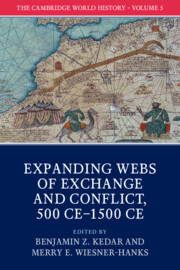Book contents
- The Cambridge World History
- The Cambridge World History
- The Cambridge World History
- Copyright page
- Dedication
- Contents
- Figures
- Maps
- Table
- Contributors
- Preface
- 1 Introduction
- Part I Global developments
- Part II Eurasian commonalities
- Part III Growing interactions
- Part IV Expanding religious systems
- Part V State formations
- 18 State formation and empire building
- 19 State formation in China from the Sui through the Song dynasties
- 20 The Mongol Empire and inter-civilizational exchange
- 21 Byzantium
- 22 Early polities of the Western Sudan
- 23 Mesoamerican state formation in the Postclassic period
- 24 State and religion in the Inca Empire
- 25 “Proto-globalization” and “Proto-glocalizations” in the Middle Millennium
- Index
25 - “Proto-globalization” and “Proto-glocalizations” in the Middle Millennium
from Part V - State formations
Published online by Cambridge University Press: 05 May 2015
- The Cambridge World History
- The Cambridge World History
- The Cambridge World History
- Copyright page
- Dedication
- Contents
- Figures
- Maps
- Table
- Contributors
- Preface
- 1 Introduction
- Part I Global developments
- Part II Eurasian commonalities
- Part III Growing interactions
- Part IV Expanding religious systems
- Part V State formations
- 18 State formation and empire building
- 19 State formation in China from the Sui through the Song dynasties
- 20 The Mongol Empire and inter-civilizational exchange
- 21 Byzantium
- 22 Early polities of the Western Sudan
- 23 Mesoamerican state formation in the Postclassic period
- 24 State and religion in the Inca Empire
- 25 “Proto-globalization” and “Proto-glocalizations” in the Middle Millennium
- Index
Summary
- Type
- Chapter
- Information
- The Cambridge World History , pp. 665 - 684Publisher: Cambridge University PressPrint publication year: 2015
- 3
- Cited by



